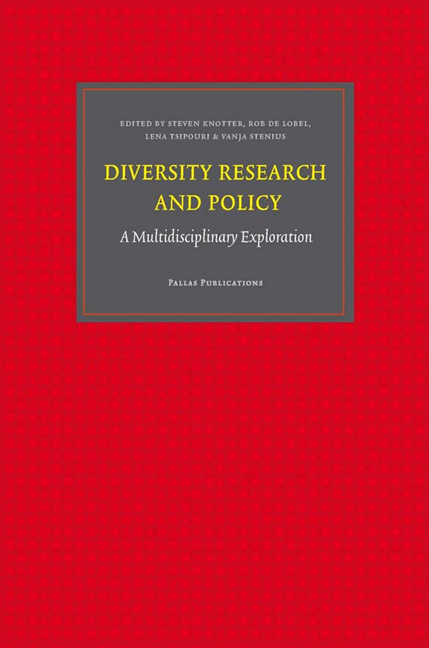Book contents
- Frontmatter
- Contents
- Acknowledgements
- 1 An Introduction
- 2 Diversity and Social Anthropology
- 3 Diversity and Sociology
- 4 Diversity and Criminology
- 5 Diversity and Ecology/Ecological Economics
- 6 Linguistic Diversity
- 7 Diversity and Architecture
- 8 Diversity and Urban Planning
- 9 Diversity and Economics
- 10 Diversity and Diversity Management in Business and Organisation Studies
- 11 Diversity and (Organisational) Psychology
- 12 Diversity and Law
- 13 Diversity and Public Policy
- 14 Conclusion
- About the Authors
- About the Reviewers
8 - Diversity and Urban Planning
Published online by Cambridge University Press: 15 January 2021
- Frontmatter
- Contents
- Acknowledgements
- 1 An Introduction
- 2 Diversity and Social Anthropology
- 3 Diversity and Sociology
- 4 Diversity and Criminology
- 5 Diversity and Ecology/Ecological Economics
- 6 Linguistic Diversity
- 7 Diversity and Architecture
- 8 Diversity and Urban Planning
- 9 Diversity and Economics
- 10 Diversity and Diversity Management in Business and Organisation Studies
- 11 Diversity and (Organisational) Psychology
- 12 Diversity and Law
- 13 Diversity and Public Policy
- 14 Conclusion
- About the Authors
- About the Reviewers
Summary
A Brief Description of the Discipline of Urban Planning
Although urban planning as an art and practice is as old as cities, it only became an organised discipline when it engaged scientific theories and methods to study the relationship between space and human behaviour and to apply this knowledge to the production of an ordered urban environment. It did this by incorporating knowledge from sciences such as engineering, architecture, political and social sciences, health and biology. Initially focused on the rational ordering of space (i.e., land use, aesthetics and physical layout principally), it added new foci, methodologies and theories, over time eventually organising into distinct subfields such as land use and physical/ economic development; transportation, infrastructure, housing, social, community development and environmental planning. Urban planning also works closely with sister disciplines such as public health, education, disability studies, architecture and the arts. Altogether, urban planning is the integration of different disciplines to explore and address a wide range of aspects of the built and social environments of cities. Typical products include plans and policies targeting urban matters of special importance to stakeholders. Traditionally, plans regulated urban form, design and land use, as well as transportation. Over time, other plans and policies focusing for instance on economic development, natural resources and quality of life or in particular sub-areas of cities have been developed within the different subfields of planning. Planning also concerns itself with growth management, the development of open land and the revitalisation of already built environments. It includes activities as diverse as goal setting, data collection and analysis, forecasting, design, strategic thinking, area studies/profiles, policy and public consultation. Although the original proposal of scientific rationality (à la exact sciences) is still at its root, today the field encompasses a variety of paradigmatic approaches, many of them highly critical of this approach. Practically all sciences address the urban in one way or the other; what is most specific to planning is the production, regulation and ongoing reorganisation of space, place and community.
Diversity in the Discipline of Urban Planning
Although the term diversity was largely coined in Europe and often stands for multiculturalism, different versions have circulated in the conversations and practices of different societies.
- Type
- Chapter
- Information
- Diversity Research and PolicyA Multidisciplinary Exploration, pp. 117 - 134Publisher: Amsterdam University PressPrint publication year: 2012



